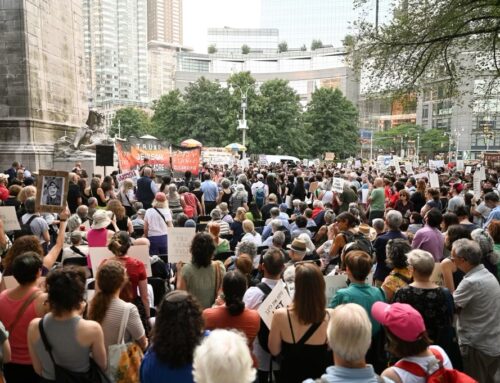PRESIDENT’S MESSAGE
Two Leaders on the Same Path?
April 2025
Most of us remain bewildered and thrown off-balance by the shock and awe and “flooding the zone” tactic employed on a daily basis by Donald Trump and his administration since January 20. It has exceeded our expectations and even our imaginations as to what he would dare to do. We are still groping in the dark for strategies, and especially leaders, to help us stymie Trump’s obvious intention to destroy our system of checks and balances and substitute a new authoritarian order based on the rightwing vision of the “unitary executive.” So far, he is apparently succeeding. To our dismay and horror, he has stocked his administration’s ranks with fringe individuals, many affiliated with far-right ideologies we are barely aware of, who are taking their wood chippers to governmental institutions we (naively) assumed were permanent.
The American Jewish pro-Israel left is experiencing all of the above as Americans, but we are essentially are getting a double dose of anguish as we watch a similar process simultaneously taking place in Israel. The ongoing shredding of its governmental structures by Bibi Netanyahu – accompanied by the unnecessarily renewed war on Gaza – are likely dooming those hostages left alive and killing perhaps thousands more Gazans in a futile quest to “destroy” Hamas. That this is abetted by the Trump administration, which is the USA, that is “us,” adds to our anguish and non-comprehension.
At the same time we have to acknowledge that it was the same Donald Trump (through his minion Steve Witkoff) who induced Bibi Netanyahu to accede to a 2-month cease-fire, something that Joe Biden, with whom we share far more values, was never able to accomplish. It was Biden who articulated the bases for a cease-fire in May 2024, but he was never able to get Bibi to agree, succeeding only in attracting ire from groups across the political spectrum who vehemently disagreed on everything else. Meanwhile, Hamas’s demands have remained largely the same since nearly the beginning of the war (begun by the Oct. 7 massacre, lest we forget). These aims are, and have been, basically:
- A permanent cease fire
- The IDF stationed on the border (and perhaps the Netzarim corridor)
- Release of several thousand Palestinian prisoners
In return for
- Release of all hostages, including the dead,
- Hamas relinquishes a political role in Gaza
There are many additional details but the central conditions are that Israel must withdraw from Gaza and agree to a permanent cease fire to get back the remaining hostages. Sixty-nine percent of Israelis agree with that.
The dominant forces in the government do not, however, for several different reasons. The unifying theme for them is that the current government must be kept together until the scheduled elections in late 2026, a year and a half from now. That means that Bibi remains as Prime Minister and no State Commission will investigate what happened prior to and on October 7, 2023, including the culpability and accountability of the prime minister, his aides, and other officials. Thus the war will continue until then, as demanded by the far right parties led by Ben-Gvir and Smotrich. By the same token, Haredim have made it clear that they expect a new draft exemption law to be enacted by the end of the Knesset’s summer session in July.
The coalition now controls 68 of 120 votes in the Knesset. If a permanent cease fire were to be agreed to, the far right (14 seats) would drop out. If the widely unpopular Haredi draft exemption is not passed, 18 votes are lost. You do the math. The pipers must be paid.
The last roadblock on a free and clear path for the government to continue until late 2026 disappeared on March 25 when the state budget was passed. Failure to approve it by March 31 would have automatically meant immediate elections. Thus, weirdly, the resumption of the war on March 18 was unquestionably triggered by the need to approve the state budget.
Demonstrators have reappeared in large numbers calling for release of the hostages (and now explicitly linking that against the resumption of the war), but many Israelis are too tired and traumatized by the events of the last two and a half years to go out in the streets again, at least so far. Moreover, the coalition is now used to and hardened against popular demonstrations. Bibi has clawed his way back to a respectable place in the polls, though he probably would not be able to form a government if the election were held today.
Despite the increased pace of demonstrations, the coalition is taking full advantage of its majority to consolidate power and continue its project, interrupted by the attacks of October 7, 2023, to eviscerate the already meager guardrails protecting Israeli democracy. Despite legal constraints, Bibi has now fired the head of the Shin Bet (General Security Services), which was investigating a major security scandal in the PM’s office, and is about to do the same with the Attorney General, who has opposed him on key issues. A new A.G. might well dismiss the criminal trial against Bibi, which has been going on for the last four years. In addition, the Knesset on March 28 finally changed the rules for appointing judges to make the process far more politicized, the issue which had originally brought out the mass protests in 2023. Now, with the coalition more firmly seated than at any time since its inception, its members are introducing a flood of bills on communications, higher education, and minority rights. It is not at all coincidental that these are similar issues to those being targeted by the Trump administration in the US, as well as a number of other would-be authoritarians around the world (think Orban in Hungary, Erdogan in Turkey, Putin in Russia, and Modi in India, to name a few).
What Bibi and Trump have in common is unprecedented control over their respective parties and a yearning to ‘streamline”’ their respective governments in order to increase their (and their eventual ideological successors’) power. For Bibi, the main obstacle is the courts, especially the Israeli Supreme Court, so politicizing the appointments process is his top priority. Trump, on the other hand, already has a plausible (though not entirely reliable) super-majority on the US Supreme Court, but his chosen enemy is the allegedly “woke” bureaucracy, especially in the “liberal” agencies, such as USAID and the Department of Education, but especially the watchdog civil servants such as inspector-generals, who were among the first to be fired.
Having spent years inveighing against the alleged “Deep State” and caring nothing about the process of governing, Trump is happy to allow Elon Musk to shred whatever he wishes. Bibi, by contrast, is an experienced politician who only needs to remove selected top officials and appoint pliable successors. Unlike Trump, he has a reliable, sufficient majority in the legislature, so he does not need to rule by decree like Trump. But both are intent on cutting down the scope for civil society; Bibi by going after NGO’s, while Trump has been attacking major Democratic-oriented law firms and even businesses like Costco.
Unsurprisingly, Bibi’s rhetoric has now started to reflect Trump’s, with new talk of an Israeli “Deep State.” However, after years of attacks on Israel’s democratic institutions, his Knesset majority, and Israel’s lack of a constitution and other safeguards, Bibi seems well ahead of Trump in his wrecking job.
Ahead except for one factor: the Israeli people. Israel’s civil society is out in front of all other democratically backsliding countries in the strength of its response to incipient authoritarianism. For nine months, from January to October 6, 2023, Israelis demonstrated daily and weekly in their tens and hundreds of thousands, slowing and nearly stopping the government’s wrecking “judicial reform.” Then came the October 7 attacks – and the country immediately switched to war mode, which very many now feel has been hijacked for Bibi’s personal agenda.
Americans need to learn from Israeli civil society. Perhaps massive demonstrations aren’t the key tactic here, since the US is so much larger. But Israelis rallied immediately to save their democracy, displaying determination, discipline, unity, leadership, strategy, persistence, and nonviolence. I hope we can do the same.
Paul Scham

Paul Scham is President of Partners for Progressive Israel and Director of the Gildenhorn Institute for Israel Studies at the University of Maryland, where he is a Professor of Israel Studies.




